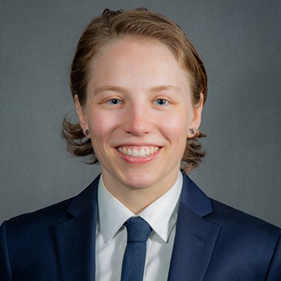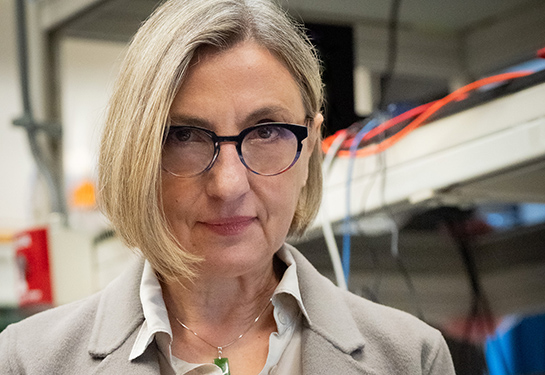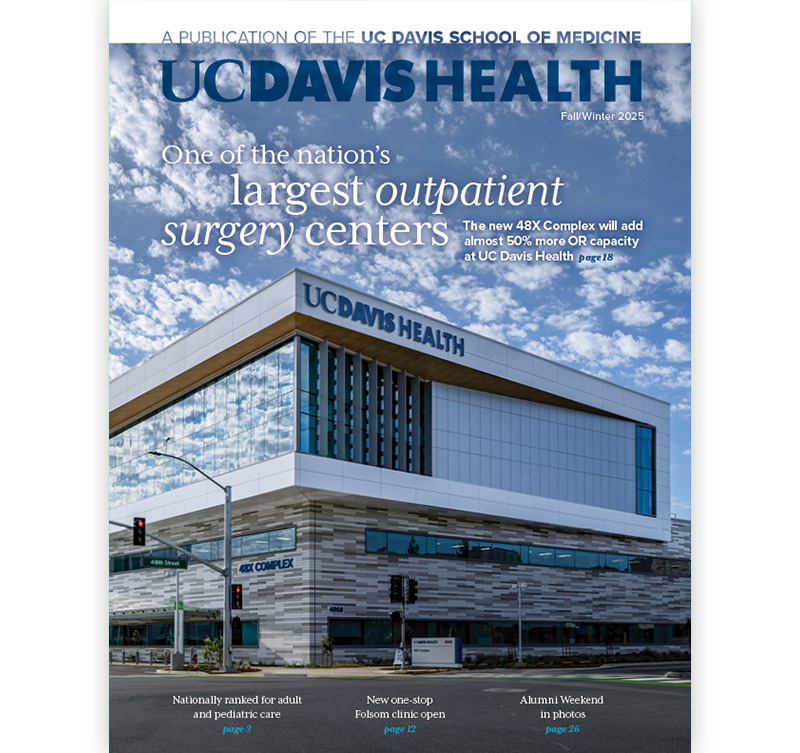Medical student uses research to advocate for the unhoused
Ren Bruguera presented their work on sexually transmitted infection testing and homelessness at a national conference
Fourth-year medical student Ren Bruguera has a soft spot for people experiencing homelessness — especially when their situation makes it tough for them to access health care. Homelessness, Bruguera notes, is a public health issue that is sometimes linked to an increased risk of sexually transmitted infections (STI), such as syphilis and HIV.
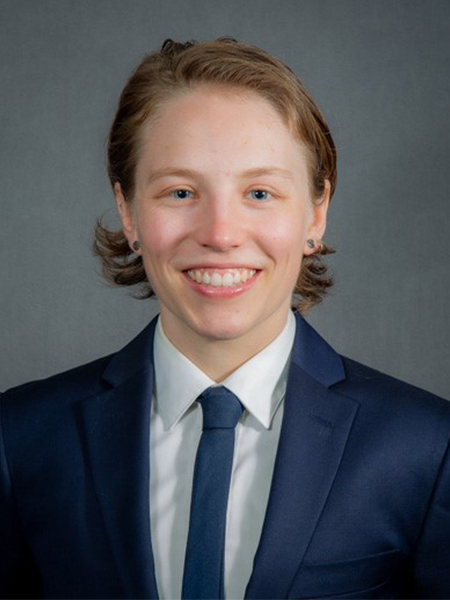
Bruguera is devoted to learning more about what motivates people experiencing homelessness to access health care. They spent a year researching why unhoused individuals choose to be tested for STIs.
Their research got the attention of the Society of Teachers of Family Medicine (STFM), a national group that seeks to improve health through the future workforce. The organization awarded Bruguera a highly competitive scholarship to attend and present their findings at the organization’s annual conference in Atlanta last month.
“I was thrilled to present the poster in Atlanta,” Bruguera said, calling the conference an “enriching” experience.
“I attended many sessions on medical education and health equity and how they are taught at various institutions. It was also great to learn about different paths to keep teaching and mentorship in my family medicine career.”
Bruguera was one of 23 people who received a $500 scholarship from STFM, an amount matched by an award from the UC Davis Department of Family and Community Medicine. In addition, Bruguera’s research was funded in part by the UC Davis Division of Diversity, Equity and Inclusion through its Racial Justice/Health Equity Research Scholars Award.
Bruguera completed three years of medical school, then dedicated a year to research. The project was inspired by people they admire who work in harm reduction — a non-judgmental approach to helping those who are often marginalized, including drug users, to improve their lives.
Uplifting the voices of the unhoused
The research, a qualitative study, took Bruguera to two non-profit organizations in Yolo County: a domestic violence and family services center, and a health center that operates a mobile medicine clinic. The mobile clinic offers primary care medical services to people experiencing homelessness.
Bruguera recruited and interviewed 50 clients between the two sites to understand the factors that contribute to the decision of people experiencing homelessness to seek or accept STI testing.
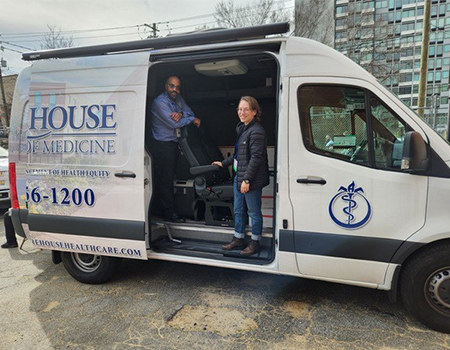
“One of my main priorities in this work is to uplift the voice of people experiencing homelessness in academic medical spaces and literature,” Bruguera said.
Some of the key findings include:
- Many people experiencing homelessness avoid getting routine and preventive health care services due to prior negative treatment in medical environments. They report feelings of dehumanization.
- Health care systems should consider how interpersonal, institutional, political, and structural factors contribute to the experience of homelessness, in order to facilitate more equity and inclusivity.
- By “meeting people where they are,” as exemplified by the mobile clinic, providers can break down the complex social barriers that discourage people experiencing homelessness from seeking care.
“Notably, participants shared many negative experiences and exclusion in health care settings, creating barriers far beyond the realm of sexual health,” Bruguera said. “This bears many implications for creating more inclusive health care models, of which mobile medicine units may be one example.”
One of my main priorities in this work is to uplift the voice of people experiencing homelessness in academic medical spaces and literature.” —Ren Bruguera
Mentorship anchored in community engagement
Bruguera said they received invaluable guidance from several mentors from the UC Davis Health Department of Family and Community Medicine who are well-versed in caring for vulnerable populations.
Their mentors, including Na’amah Razon and Alicia Agnoli, said they are impressed with Bruguera’s curiosity, humility, empathy and drive to bring attention to important issues facing people experiencing homelessness.
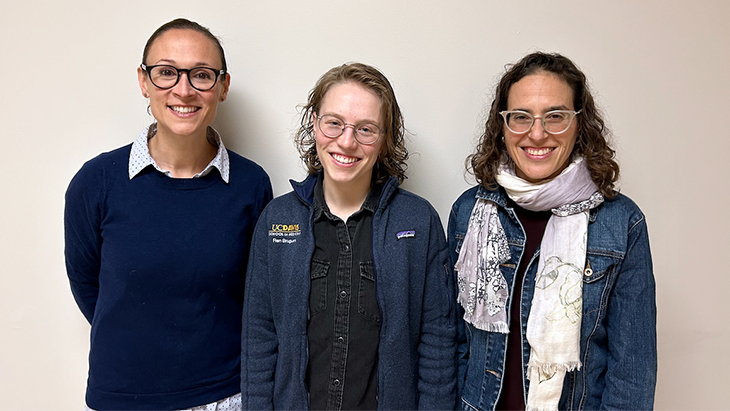
“I have been able to see Ren present their findings to their community partners and county public health officials and witnessed how skillfully this young person can frame the public health issue for an audience,” said Agnoli, an associate professor who specializes in addiction medicine. “It is rare to find someone at this stage of training who can so skillfully combine passion for health equity and aptitude for scholarly inquiry.”
She added: “This work provides a critical examination of the intersecting forces of homelessness, racism and health care access in these communities.”
Razon, a family physician who is also a medical anthropologist, praised Bruguera for their “robust qualitative research methods to provide medical and public health teams with knowledge directly from patients about the barrier of care — what models of care work, and the type of education needed for health care to provide robust care to this community.”
Razon and Agnoli are listed as co-authors on the poster Bruguera presented at the STFM conference, which highlights the Yolo County research. Three months earlier, Bruguera presented the poster at the North American Primary Care Research Group’s annual meeting in San Francisco.
The poster’s title: “When Care is Uncaring: Homelessness Stigma in Health Care and Mobile Medicine as a Model for Healing.”
Bruguera will soon experience yet another highlight of medical school, when they’ll learn where they’ll spend the next three years in training to specialize in family medicine.
Bruguera wants to land at an institution that offers clinical work and teaching opportunities. The ideal place, they said, will support fellow trainees in “exploring the complex roots of health inequities” and how to address them.
“I am hoping to care for patients of many backgrounds, but especially those who have faced historical exclusion from medical systems,” they said. “This includes queer and transgender patients, immigrant and undocumented communities — especially Spanish-speaking individuals —people who experience homelessness and people who use drugs.”


